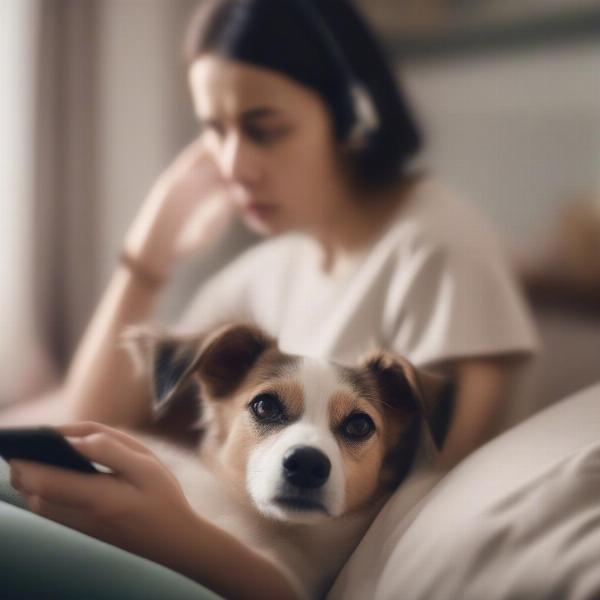Dog whining after sedation is a common occurrence and can be concerning for pet owners. Understanding why your dog is whining and how to address their discomfort is key to ensuring a smooth recovery. This article will delve into the reasons behind post-sedation whining, offer practical tips for managing it, and provide guidance on when to seek veterinary attention.
Why is My Dog Whining After Sedation?
Several factors can contribute to a dog’s whining after a sedative procedure. The most common reasons include:
- Pain or Discomfort: Sedation doesn’t eliminate pain completely. Your dog might be experiencing discomfort from the procedure itself, or from underlying conditions.
- Nausea: Some sedatives can cause nausea, leading to whining and other signs of discomfort.
- Disorientation and Confusion: Emerging from sedation can be a disorienting experience. Dogs may whine due to feeling confused and unsure of their surroundings.
- Anxiety and Fear: The unfamiliar sensations and environment after sedation can trigger anxiety and fear in some dogs. Whining can be a manifestation of this stress.
- Cold: Sedation can lower body temperature. If your dog is feeling cold, they might whine to communicate their discomfort.
Managing Your Dog’s Whining at Home
Here are some practical steps you can take to help soothe your dog and minimize whining after sedation:
- Create a Calm and Comfortable Environment: Provide a quiet, dimly lit space where your dog can rest undisturbed. A soft bed or blanket can offer added comfort.
- Maintain a Consistent Temperature: Ensure your dog isn’t too cold by providing blankets or a warm water bottle wrapped in a towel.
- Offer Gentle Reassurance: Speak to your dog in a calm and soothing voice. Gentle petting can also provide comfort.
- Follow Veterinary Instructions: Adhere to your veterinarian’s instructions regarding post-sedation care, including medication and feeding schedules.
- Monitor for Other Symptoms: Watch for any other signs of discomfort, such as vomiting, excessive panting, or difficulty walking.
When to Seek Veterinary Attention
While some whining is normal after sedation, it’s essential to monitor your dog for signs of complications. Contact your veterinarian immediately if you observe any of the following:
- Prolonged or Excessive Whining: Whining that persists for an extended period or increases in intensity can indicate a problem.
- Other Signs of Distress: Look for vomiting, diarrhea, difficulty breathing, or any other unusual behavior.
- Lack of Improvement: If your dog’s condition doesn’t improve within a reasonable timeframe, consult your veterinarian.
 Concerned Dog Owner Calling Vet
Concerned Dog Owner Calling Vet
Is it Normal for My Dog to Whine After Anesthesia?
Yes, it’s quite common. The effects of anesthesia are similar to sedation, and the disorientation, discomfort, and nausea can cause whining.
How Long Does it Take for a Dog to Recover from Sedation?
Recovery time varies depending on the type and dosage of sedative used, as well as the individual dog. Most dogs recover within 24 hours, but some may take longer.
Can I Give My Dog Pain Medication After Sedation?
Only administer pain medication prescribed by your veterinarian. Never give human pain relievers to your dog, as many are toxic to them.
Conclusion
Dog whining after sedation is often a normal part of the recovery process. By creating a comfortable environment, offering reassurance, and monitoring for any concerning symptoms, you can help your dog through this period. However, if you have any doubts or concerns about your dog’s well-being, always contact your veterinarian.
FAQ
- Why is my dog whining and shaking after sedation? This could be due to pain, cold, or anxiety. Contact your vet if it persists.
- How can I comfort my dog after sedation? Create a quiet, comfortable space, offer gentle reassurance, and follow your vet’s instructions.
- What should I feed my dog after sedation? Start with small amounts of bland food and water as directed by your vet.
- Is it normal for my dog to be lethargic after sedation? Yes, lethargy is common. However, excessive lethargy warrants a call to your vet.
- How long will my dog be whiny after sedation? Whining typically subsides as the sedative wears off, usually within 24 hours.
- Can I leave my sedated dog alone? No, it’s crucial to supervise your dog during recovery.
- My dog is panting heavily after sedation. Is this normal? Some panting is normal, but excessive panting could indicate pain or anxiety. Contact your vet.
ILM Dog is a leading online resource for dog owners worldwide, offering expert advice on dog breeds, health, training, nutrition, grooming, and much more. From choosing the right breed to providing the best possible care, ILM Dog is dedicated to helping you navigate every aspect of dog ownership. For personalized guidance and support, contact us at [email protected] or call us at +44 20-3965-8624. We at ILM Dog are committed to your furry friend’s well-being.